-
 Gang members in Guatemala kill seven police after prison crackdown: minister
Gang members in Guatemala kill seven police after prison crackdown: minister
-
Villa's title bid rocked by Everton loss, Newcastle held at Wolves

-
 Dybala boosts Roma's Champions League hopes, Fiorentina honour Commisso
Dybala boosts Roma's Champions League hopes, Fiorentina honour Commisso
-
Villa's title bid rocked by Everton loss, Newcastle held by Wolves

-
 'Avatar: Fire and Ash' at number one in N.America for fifth straight week
'Avatar: Fire and Ash' at number one in N.America for fifth straight week
-
Limited internet returns in Iran after protest blackout

-
 Syria's leader agrees truce deal with Kurds after govt troops advance
Syria's leader agrees truce deal with Kurds after govt troops advance
-
Smith's penalty sees Quins eliminate La Rochelle, Bordeaux secure top seeding

-
 Atletico edge Alaves to strengthen Liga top-four hold
Atletico edge Alaves to strengthen Liga top-four hold
-
Uganda president says opposition 'terrorists' in victory speech

-
 New Zealand register first ODI series win in India despite Kohli ton
New Zealand register first ODI series win in India despite Kohli ton
-
Elvira wins Dubai Invitational after Lowry's last hole meltdown

-
 Jeong snatches Union late draw at Stuttgart in Bundesliga
Jeong snatches Union late draw at Stuttgart in Bundesliga
-
Man Utd's Martinez hits back at Scholes after height jibes

-
 Frank on the brink as Romero calls for unity amid Spurs 'disaster'
Frank on the brink as Romero calls for unity amid Spurs 'disaster'
-
Chile declares emergency as wildfires kill at least 15

-
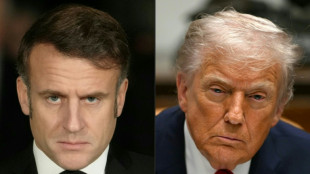 Europe hits back at Trump tariff threat over Greenland
Europe hits back at Trump tariff threat over Greenland
-
Men's Fashion Week in Paris: what to watch
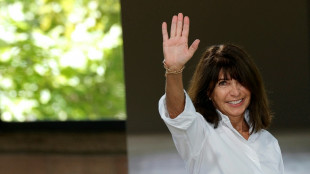
-
 McGrath goes top of slalom standings with Wengen win
McGrath goes top of slalom standings with Wengen win
-
No Venus fairytale as Alcaraz, Sabalenka win Melbourne openers
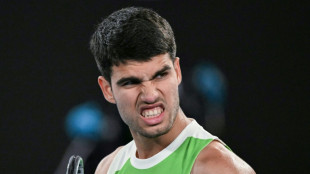
-
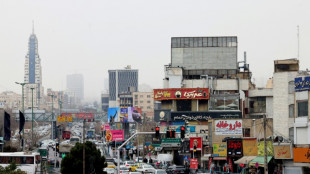 Iran considers 'gradually' restoring internet after shutdown
Iran considers 'gradually' restoring internet after shutdown
-
Mitchell, Phillips tons guide New Zealand to 337-8 in ODI decider
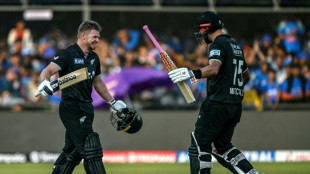
-
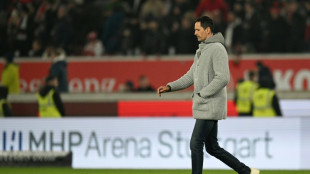 Flailing Frankfurt sack coach Toppmoeller
Flailing Frankfurt sack coach Toppmoeller
-
Kurdish forces withdraw from Syria's largest oil field as govt forces advance
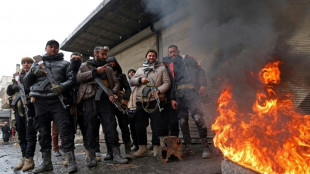
-
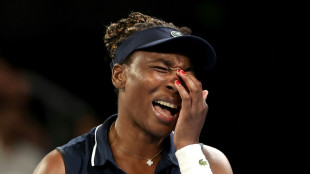 'Proud' Venus Williams, 45, exits Australian Open after epic battle
'Proud' Venus Williams, 45, exits Australian Open after epic battle
-
Vonn in Olympic form with another World Cup podium in Tarvisio super-G

-
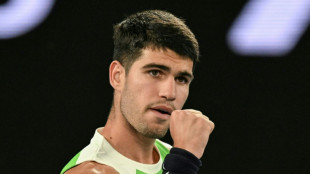 Alcaraz kicks off career Grand Slam bid with tough Australian Open test
Alcaraz kicks off career Grand Slam bid with tough Australian Open test
-
Hosts Morocco face Mane's Senegal for AFCON glory
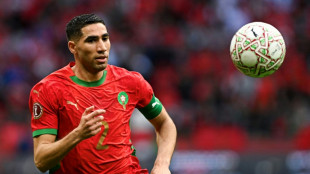
-
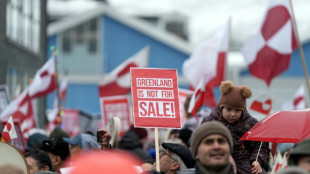 Europe scrambles to respond to Trump tariff threat
Europe scrambles to respond to Trump tariff threat
-
Venus Williams, 45, exits Australian Open after epic battle
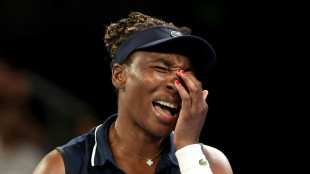
-
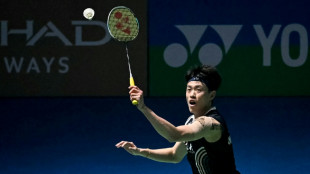 Taiwan's Lin wins India Open marred by 'dirty' conditions
Taiwan's Lin wins India Open marred by 'dirty' conditions
-
Indonesia rescuers find body from plane crash

-
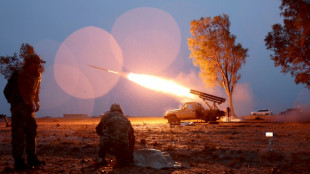 Kurdish-led forces withdraw from Syria's largest oil field: monitor
Kurdish-led forces withdraw from Syria's largest oil field: monitor
-
Ball girl collapses in Australian Open heat as players rush to help
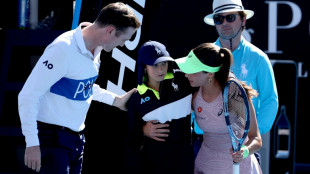
-
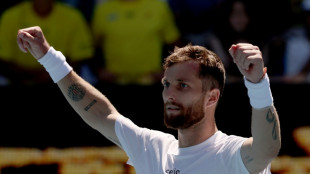 France's Moutet booed for underarm match point serve in Melbourne
France's Moutet booed for underarm match point serve in Melbourne
-
Zverev happy with response after wobble in opening Melbourne win

-
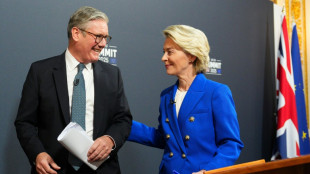 'Bring it on': UK's Labour readies for EU reset fight
'Bring it on': UK's Labour readies for EU reset fight
-
New Zealand's Wollaston wins again to lead Tour Down Under

-
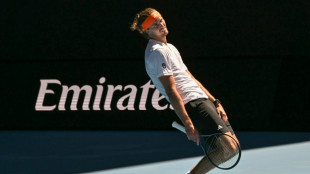 Zverev wobbles but wins at Australian Open as Alcaraz enters fray
Zverev wobbles but wins at Australian Open as Alcaraz enters fray
-
British qualifier upsets 20th seed Cobolli to make mum proud

-
 Zverev drops set on way to Australian Open second round
Zverev drops set on way to Australian Open second round
-
Indonesian rescuers find debris from missing plane

-
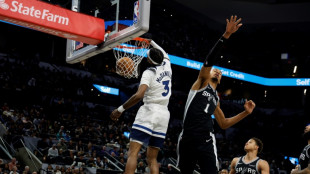 Wembanyama scores 39 as Spurs overcome Edwards, Wolves in thriller
Wembanyama scores 39 as Spurs overcome Edwards, Wolves in thriller
-
Heartbreak for Allen as Broncos beat Bills in playoff thriller

-
 British qualifier upsets 20th seed Cobolli in Melbourne
British qualifier upsets 20th seed Cobolli in Melbourne
-
Paolini races into round two to kickstart Australian Open

-
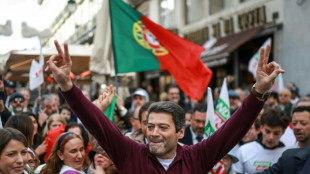 Portugal presidential vote wide open as far-right surge expected
Portugal presidential vote wide open as far-right surge expected
-
Lutz kicks Broncos to overtime thriller as Bills, Allen fall short

-
 Marchand closes Austin Pro Swim with 200m breaststroke win
Marchand closes Austin Pro Swim with 200m breaststroke win
-
Raducanu says Australian Open schedule 'does not make sense'

Iran's nuclear dilemma: peace or war?
Iran faces a dilemma: should it abandon its controversial nuclear programme in order to avoid international sanctions and avert a possible military conflict, or should it continue to insist on its right to peaceful use of nuclear energy, even if this increases the risk of war? This question has preoccupied the international community for years, and tensions have recently risen again.
Iran's nuclear programme began in the 1950s with US support under the ‘Atoms for Peace’ programme. In 1967, another reactor was delivered from the US, and in 1970 Iran ratified the Nuclear Non-Proliferation Treaty (NPT). However, after the Islamic Revolution in 1979, the programme was secretly continued. In 2002, undeclared nuclear activities were discovered, leading to an investigation by the International Atomic Energy Agency (IAEA) and international sanctions.
In 2015, the Joint Comprehensive Plan of Action (JCPOA) was signed, in which Iran committed to limiting its nuclear programme in exchange for the lifting of sanctions. In 2018, the United States withdrew from the agreement under President Trump and imposed new sanctions. Iran then began to exceed the limits set out in the JCPOA.
According to recent IAEA reports, Iran has significantly expanded its uranium enrichment. In February 2025, the country had just under 275 kilograms of uranium enriched to 60 per cent. Experts estimate that Iran is only a few months away from having enough fissile material for a nuclear bomb. According to US officials and IAEA experts, Iran has enough enriched uranium for at least three nuclear bombs and could build a primitive bomb within a few months.
Despite the tensions, efforts are being made to find a diplomatic solution. In April 2025, indirect talks between the US and Iran took place in the Sultanate of Oman. Both sides spoke of a ‘constructive and positive atmosphere’. However, Iran rejects direct negotiations with the US and insists that the US must first lift sanctions. A senior Iranian official, Ali Shamkhani, rejected a US offer to allow Iran to have a civilian nuclear programme similar to that of the UAE, arguing that Iran would not give up its right to enrich uranium. Despite the negotiations, Iran is continuing its uranium enrichment, and planned talks with the US have been cancelled, further increasing tensions.
A nuclear-armed Iran could lead to a nuclear arms race in the Middle East and threaten regional stability. There is also a risk of military conflict, which would have far-reaching consequences. The US and Israel have repeatedly threatened military strikes if Iran does not halt its nuclear programme. Some experts argue that destroying the nuclear facilities would not be enough and that a complete overthrow of the regime would be necessary to eliminate the threat.
Iran could abandon its nuclear programme and in return achieve the lifting of sanctions and a normalisation of relations with the West. Alternatively, it could continue to insist on its right to the peaceful use of nuclear energy, but this would increase the risk of further sanctions and possible military action. The decision will also be influenced by internal factors, such as the precarious economic situation and strong nationalist sentiment in the country.
Iran's nuclear dilemma remains one of the greatest challenges facing the international community. A peaceful solution requires diplomatic skill, a willingness to compromise and the trust of all parties involved. The alternative – military conflict – would be disastrous for all sides.

EU vs. Hungary: Lawsuit over ‘national sovereignty’ law

Ukraine: Zelenskyy appeals for international aid

Lebanon: Is a new wave of refugees coming to the EU?

Terrorist state Iran attacks Israel with missiles

Belarus: ICC investigates dictator Lukashenko

NATO: Ukraine ‘at the top of the list!’

NATO is training to fight cyber attacks

Digital Ocean Twin: Protecting the Oceans

What is the outlook for France’s economy?

How melting Alpine glaciers affect valleys

The EU Commission and its climate targets?




